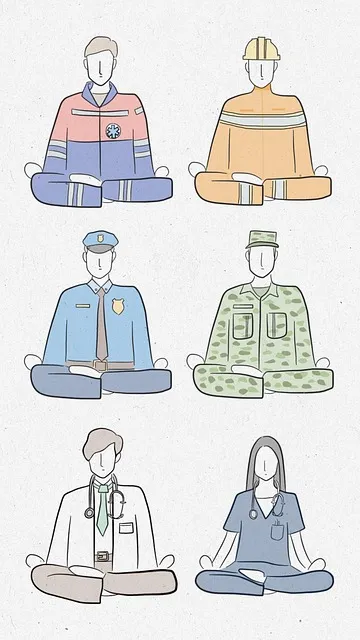Depression prevention starts with recognition of its diverse symptoms, including persistent sadness, changes in eating/sleep patterns, fatigue, and thoughts of worthlessness. Westminster Kaiser mental health classes offer effective tools for early detection through stress management, empathy-building strategies, evidence-based practices, mindfulness techniques like CBT, conflict resolution, and positive self-talk. Adopting healthy lifestyle changes such as regular exercise, balanced diet, and adequate sleep also significantly improves mental wellness. These classes cater to healthcare providers and the general public, promoting resilience, emotional coping abilities, and community mental health literacy.
Depression is a prevalent and serious condition, but it’s not insurmountable. Understanding its signs and symptoms is the first step towards prevention. This article explores a multi-faceted approach, including Westminster Kaiser mental health classes, to equip individuals with tools for managing and preventing depression. We delve into lifestyle changes, resilience-building strategies, and the transformative power of education through Westminster Kaiser’s offerings. By adopting these tactics, we can foster better mental well-being and enhance our ability to navigate life’s challenges.
- Understanding Depression: Recognizing Signs and Symptoms
- Westminster Kaiser Mental Health Classes: An Overview of Offerings
- Lifestyle Changes for Improved Mental Well-being
- Building Resilience: Coping Strategies for Long-term Prevention
Understanding Depression: Recognizing Signs and Symptoms

Depression is a complex mental health condition that impacts millions worldwide. Understanding its signs and symptoms is an essential first step in prevention. While it may present differently for everyone, common indicators include persistent feelings of sadness or emptiness, loss of interest or pleasure in activities once enjoyed, changes in appetite or sleep patterns, fatigue, difficulty concentrating, and thoughts of worthlessness or suicide.
Westminster Kaiser mental health classes offer valuable resources for individuals seeking to enhance their mental wellness. These classes cover a range of topics, including stress management and empathy building strategies, which are proven to be effective tools in recognizing and addressing early warning signs of depression. The Mental Wellness Podcast Series Production also provides accessible information on various aspects of mental health, encouraging open conversations and promoting awareness about the importance of seeking help.
Westminster Kaiser Mental Health Classes: An Overview of Offerings

Westminster Kaiser Mental Health Classes provide a comprehensive range of services designed to promote mental wellness and prevent depression. Their offerings cater to various groups, including healthcare providers looking for burnout prevention strategies and the general public interested in enhancing their mental health. These classes focus on evidence-based practices tailored to address common mental health challenges such as stress management, anxiety relief, and emotional resilience.
Through interactive workshops and support groups, Westminster Kaiser empowers individuals to develop effective coping mechanisms and build a strong foundation for overall well-being. By participating in these sessions, one can gain valuable insights into managing symptoms of depression and anxiety, fostering better mental hygiene, and contributing to the development of impactful public awareness campaigns that promote mental health literacy within communities.
Lifestyle Changes for Improved Mental Well-being

Adopting healthy lifestyle changes can significantly impact and improve mental wellness. Regular physical activity, a balanced diet, and sufficient sleep are cornerstone strategies in promoting emotional well-being. Exercise, for instance, releases endorphins that boost mood and reduce stress, while a nutritious diet provides essential nutrients vital for brain health. Furthermore, incorporating mindfulness practices like meditation or yoga into daily routines can enhance coping skills development, helping individuals manage depression symptoms effectively.
Westminster Kaiser mental health classes offer valuable resources for learning effective lifestyle changes and emotional well-being promotion techniques. These classes equip participants with practical tools to navigate stress, anxiety, and depressive episodes. By engaging in these activities, individuals can foster resilience, improve their coping skills development, and ultimately, prevent or manage depression more proactively.
Building Resilience: Coping Strategies for Long-term Prevention

Building resilience is a powerful tool for long-term depression prevention. Westminster Kaiser mental health classes emphasize the importance of teaching individuals effective coping strategies that can help them navigate life’s challenges. These classes often incorporate techniques such as conflict resolution, mindfulness practices, and cognitive behavioral therapy (CBT) to empower people with skills that promote emotional well-being. By learning how to manage stress, process difficult emotions, and challenge negative thought patterns, individuals can build a stronger mental shield against depression.
Conflict resolution techniques, for instance, teach individuals how to navigate disagreements and conflicts in healthy ways, reducing the risk of feeling overwhelmed or isolated—common triggers for depression. Mind over matter principles encourage positive self-talk and reframing negative thoughts, fostering a more optimistic outlook. Additionally, mental illness stigma reduction efforts within these classes create safe spaces where people can openly discuss their struggles without fear of judgment, promoting early intervention and better long-term outcomes.
Preventing depression is a proactive approach to well-being, and Westminster Kaiser mental health classes offer valuable resources. By understanding the signs, adopting lifestyle changes, building resilience, and utilizing available support systems like these classes, individuals can navigate and overcome potential mental health challenges. Combining education with practical strategies equips folks with the tools needed to foster a healthier mind, ultimately enhancing their overall quality of life.






